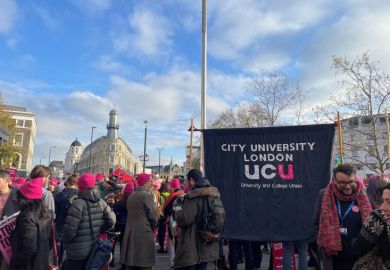When Nigel Piercy resigned as dean of Swansea University’s School of Management after two turbulent years, few people were left wondering what he thought about his former colleagues at the Welsh university.
Professor Piercy had clashed repeatedly with staff, warning them the school was “not a rest home for refugees from the 1960s with their ponytails and tie-dyed T-shirts”. Trade unionists were described as “unpleasant and grubby little people…usually distinguished only by their sad haircuts, grubby, chewed fingernails and failed careers”.
A new edition of Professor Piercy’s book Market-Led Strategic Change: Transforming the Process of Going to Market may, however, offer fresh insight into his time at Swansea, which ended in July 2015.
The book contains a “case study”, subtitled “The anatomy of hate and the tactics of the gutter”, in which Professor Piercy describes the “experiences of Frank Sargent as Dean of the School of Management at Duckpond University” who is charged with “managing a strategic turnaround…for a group of failing university departments in the period 2013 to 2015”.
While stressing that “for legal reasons…Duckpond University is not an actual university”, Professor Piercy describes it as an institution “'at the end of the railway line’ in a remote part of Wales”, adding it has a “reputation for being ‘run’ by the trade unions and the Welsh Labour Party”.
Asked to turn around its “moribund” business and economics education departments by an “apparently enthusiastic vice-chancellor”, Professor Sargent sets about rapidly changing the school’s courses.
However, despite the “incredibly positive” response from students, applicants, parents and academics outside Duckpond, “Frank” suddenly faces “intractable opposition from just about every department and committee in the university”, says the update to Professor Piercy’s 1991 best-selling business studies textbook.
“PR suppressed every good news story and passed anything bad to the local paper,” the case study says, adding that “a continuous campaign of negative publicity in the local (Labour-controlled) media and local, left-wing blogs” forms part of 18 months of “orchestrated pushback” against Professor Sargent.
“People had been told it was open season on the school of management and that they would be supported from the centre in opposing change,” writes Professor Piercy, a former Warwick Business School associate dean, on the predicament of Frank Sargent, who was also, according to the case study, a “associate dean at a top-tier university business school” in the past.
Professor Sargent’s case illustrates a number of questions that those taking a “change-orientated job” should consider, says Professor Piercy.
“Everyone knows about ‘resistance to change’…[but] no-one mentions ‘zombie staff’ – the walking dead – whose only reason for staying is to be obstructive,” he writes.
“The literature rarely addresses the question of how to deal with the lazy low-performing, vile individuals who blight many organisations,” he adds, saying strategies are needed to deal with “failed, left-wing sociologists” who make false claims of bullying and harassment.
“What managers may face now is a final ‘fight to the death’ mentality from the old-world, old-Labour Marxist left in the union,” he says, stating “one or two key people, propped up by a left-wing antibusiness culture, can undermine an organisation”.
“When faced with this kind of culture of hate and gutter tactics, should you respond in kind?” he concludes.
Swansea declined to comment on the book, but a spokeswoman said that the university's School of Management was in "robust health" and is "on an upward trajectory, with a rich learning environment, strong research-led teaching, an excellent student experience and strong links with business in the region, in Wales, and internationally".
Professor Piercy, now a consultant, claims that “none of the individuals mentioned in the case is an actual person, either alive or dead”, but the new material has angered some former colleagues.
One Swansea academic told Times Higher Education that the scenario painted by Professor Piercy showed he was a “fantasist of the first order”.
Professor Piercy did not respond to a request for comment from THE.
Register to continue
Why register?
- Registration is free and only takes a moment
- Once registered, you can read 3 articles a month
- Sign up for our newsletter
Subscribe
Or subscribe for unlimited access to:
- Unlimited access to news, views, insights & reviews
- Digital editions
- Digital access to THE’s university and college rankings analysis
Already registered or a current subscriber? Login






